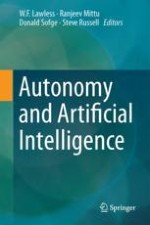2017 | OriginalPaper | Buchkapitel
9. How Children with Autism and Machines Learn to Interact
verfasst von : Boris A. Galitsky, Anna Parnis
Erschienen in: Autonomy and Artificial Intelligence: A Threat or Savior?
Aktivieren Sie unsere intelligente Suche, um passende Fachinhalte oder Patente zu finden.
Wählen Sie Textabschnitte aus um mit Künstlicher Intelligenz passenden Patente zu finden. powered by
Markieren Sie Textabschnitte, um KI-gestützt weitere passende Inhalte zu finden. powered by
